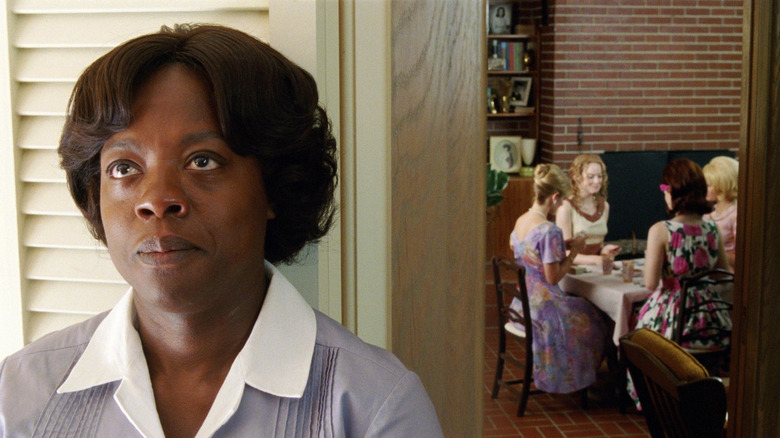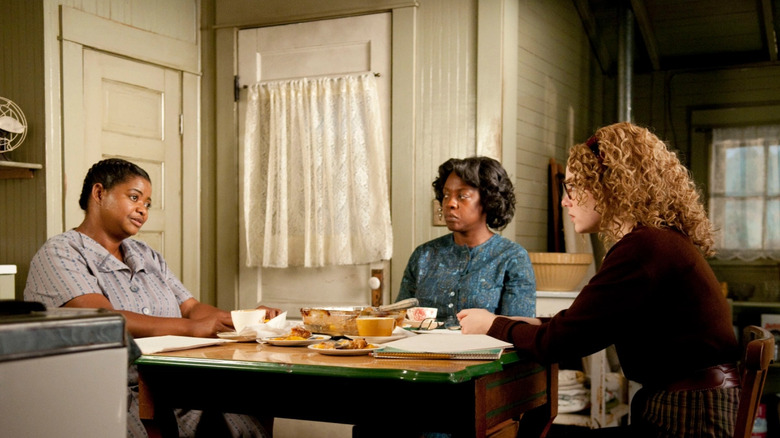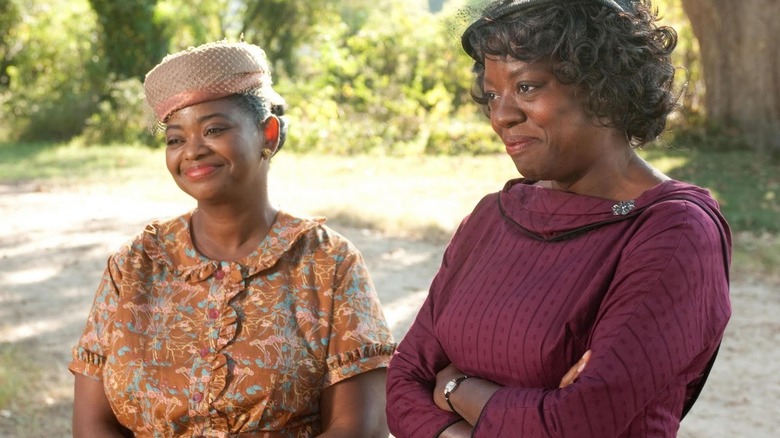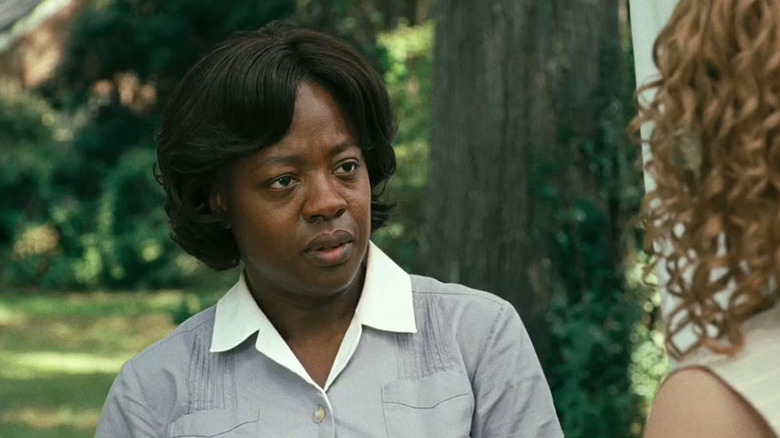In 2011, director Tate Taylor launched his historic drama “The Assist,” a narrative that focuses on Black maids working and residing with white households within the American South within the Sixties and makes an attempt to place the deal with the maids fairly than their (typically bigoted and controlling) employers. Based mostly on a novel of the identical identify by Kathryn Stockett, the film stars Viola Davis as Aibileen Clark, Octavia Spencer as Minny Jackson, and Emma Stone as Eugenia “Skeeter” Phelan, an aspiring author who takes it upon herself to compile the tales of Black maids, together with Minny and Aibileen, to inform the reality about how “the assistance” are handled — significantly in Jackson, Mississippi. Aibileen works for Skeeter’s buddy Elizabeth Leeholt (Ahna O’Reilly), a neglectful mom to her younger daughter (upon whom Aibileen dotes), whereas Minny works for the odious and merciless Hilly Holbrook (Bryce Dallas Howard) and her mom (performed by Sissy Spacek). After an incident involving a toilet and an unforgettable “apology pie,” Minny finally ends up working for Celia Foote (Jessica Chastain), a lonely and rich new addition to Jackson who finds a confidante in Minny.
To be completely blunt, whereas Taylor and Stockett’s mission right here is admirable, the film does nonetheless largely middle Stone because the story’s heroine, significantly when her guide, additionally titled “The Assist,” makes waves in Jackson by revealing among the cruelty proven to the maids by their employers (although they don’t seem to be named, it is simple sufficient to determine who’s who primarily based on context clues, sending girls like Elizabeth and Hilly right into a frenzy). So is “The Assist” primarily based on actual tales of home Black employees throughout the civil rights motion? Sure and no.
The Assist relies on a piece of fiction by Kathryn Stockett
Kathryn Stockett’s novel “The Assist” was launched in 2009, and throughout the acknowledgements, Stockett included an ode to a girl named Demetrie McLorn, who, per Stockett’s personal works, “carried us all out of the hospital wrapped in our child blankets and spent her life feeding us, selecting up after us, loving us, and, thank God, forgiving us.” Notably, the acknowledgements are adopted instantly by a private essay titled “Too Little, Too Late” that explains McLorn was Stockett’s household maid, and that Stockett was impressed by her experiences with McLorn. “I am fairly certain I can say that nobody in my household ever requested Demetrie what it felt wish to be [Black] in Mississippi, working for our white household,” Stockett writes. “It by no means occurred to us to ask. It was on a regular basis life. It wasn’t one thing individuals felt compelled to look at. I’ve wished, for a few years, that I would been sufficiently old and considerate sufficient to ask Demetrie that query. She died once I was sixteen. I’ve spent years imagining what her reply can be. And that’s the reason I wrote this guide.”
So the reality is that “The Assist” is kind of primarily based on a real story in that Stockett, who was born on the finish of the Sixties, did develop up with a Black home employee in her household residence. Stockett has actually, all through the years, confronted criticism over the truth that she spends the guide telling Black tales from a white perspective, together with utilizing phonetically written dialect — and in a 2011 interview with The Guardian, Stockett was requested by Elizabeth Day if she hesitated relating to the dialect. Apparently, McLorn additionally impressed that facet of the guide.
“It wasn’t onerous for me to get that musicality on the web page as a result of I began writing the voice of Demetrie and he or she sounded precisely the way in which I wrote her. Later, that voice grew to become the character of Aibileen,” Stockett mentioned, although she had some misgivings. “On the identical time, I used to be mortified that I used to be doing the very factor I would been taught to not do, which was to the touch on the difficulty of race, to spotlight the issues that separate us. I am nonetheless considering I will get into bother. I am nonetheless not snug with what I’ve performed. It is a unusual factor.”
After the movie adaptation was launched, The Assist was nominated for a number of Academy Awards
Regardless of completely comprehensible misgivings that folks could have about “The Assist,” there is not any denying that the movie was an infinite success when it hit theaters in the summertime of 2011. Not solely did it make a surprising $221 million on the field workplace off a funds of simply $25 million, however it ended up nominated for a number of Academy Awards, together with Greatest Image, Best Actress for Viola Davis (who lost to Meryl Streep for “The Iron Lady”), and two nominations within the Supporting Actress class for Jessica Chastain and Octavia Spencer. Finally, Spencer took residence her first Oscar for taking part in Minny Jackson (and, regardless of the film’s missteps, her efficiency is genuinely spectacular), however it’s fascinating to notice that each Davis, Chastain, and Emma Stone went on to win Oscars within the coming years for his or her performances in “Fences,” “The Eyes of Tammy Faye,” and “La La Land,” respectively.
“The Assist” additionally earned stable evaluations from critics, sitting fairly with 76% on Rotten Tomatoes with a essential consensus that reads, “Although arguably responsible of glossing over its racial themes, The Assist rises on the energy of its forged – significantly Viola Davis, whose efficiency is highly effective sufficient to hold the movie by itself.” Even detractors of “The Assist” should admit that Davis, Spencer, Chastain, Stone, and Bryce Dallas Howard, who make up the principle forged, all ship powerhouse performances that complement one another superbly … though, within the movie’s aftermath, Davis admitted that she truly regrets enjoying Aibileen in any respect.
Viola Davis says she regrets starring in The Assist
In September of 2018, Viola Davis sat down with Mekado Murphy from The New York Times in order that Murphy may ask Davis reader-submitted questions — and when one such reader requested Davis if she’d ever mentioned no to roles and later regretted it, Davis introduced up “The Assist” with none prompting in any way. “Nearly a greater query is, have I ever performed roles that I’ve regretted? I’ve, and ‘The Assist’ is on that record,” Davis answered bluntly and actually. Nonetheless, Davis clarified that she cherished working together with her co-stars — calling her fellow actresses “extraordinary human beings” with whom she constructed sturdy friendships — and praised Tate Taylor as effectively. So why did she remorse enjoying Aibileen Clark?
“I simply felt that on the finish of the day that it wasn’t the voices of the maids that had been heard,” Davis concluded. “I do know Aibileen. I do know Minny. They’re my grandma. They’re my mother. And I do know that should you do a film the place the entire premise is, I need to know what it feels wish to work for white individuals and to convey up youngsters in 1963, I need to hear how you actually really feel about it. I by no means heard that in the middle of the film.”
Just a few years later, Davis nonetheless felt the identical manner. Chatting with Vanity Fair in July 2020, Davis was much more forthcoming, saying that the movie was “created within the filter and the cesspool of systemic racism” after admitting, “There is not any one who’s not entertained by ‘The Assist.’ However there’s part of me that looks like I betrayed myself, and my individuals, as a result of I used to be in a film that wasn’t able to [tell the whole truth].”
“The Assist” is obtainable to lease or stream on main platforms now.
In 2011, director Tate Taylor launched his historic drama “The Assist,” a narrative that focuses on Black maids working and residing with white households within the American South within the Sixties and makes an attempt to place the deal with the maids fairly than their (typically bigoted and controlling) employers. Based mostly on a novel of the identical identify by Kathryn Stockett, the film stars Viola Davis as Aibileen Clark, Octavia Spencer as Minny Jackson, and Emma Stone as Eugenia “Skeeter” Phelan, an aspiring author who takes it upon herself to compile the tales of Black maids, together with Minny and Aibileen, to inform the reality about how “the assistance” are handled — significantly in Jackson, Mississippi. Aibileen works for Skeeter’s buddy Elizabeth Leeholt (Ahna O’Reilly), a neglectful mom to her younger daughter (upon whom Aibileen dotes), whereas Minny works for the odious and merciless Hilly Holbrook (Bryce Dallas Howard) and her mom (performed by Sissy Spacek). After an incident involving a toilet and an unforgettable “apology pie,” Minny finally ends up working for Celia Foote (Jessica Chastain), a lonely and rich new addition to Jackson who finds a confidante in Minny.
To be completely blunt, whereas Taylor and Stockett’s mission right here is admirable, the film does nonetheless largely middle Stone because the story’s heroine, significantly when her guide, additionally titled “The Assist,” makes waves in Jackson by revealing among the cruelty proven to the maids by their employers (although they don’t seem to be named, it is simple sufficient to determine who’s who primarily based on context clues, sending girls like Elizabeth and Hilly right into a frenzy). So is “The Assist” primarily based on actual tales of home Black employees throughout the civil rights motion? Sure and no.
The Assist relies on a piece of fiction by Kathryn Stockett
Kathryn Stockett’s novel “The Assist” was launched in 2009, and throughout the acknowledgements, Stockett included an ode to a girl named Demetrie McLorn, who, per Stockett’s personal works, “carried us all out of the hospital wrapped in our child blankets and spent her life feeding us, selecting up after us, loving us, and, thank God, forgiving us.” Notably, the acknowledgements are adopted instantly by a private essay titled “Too Little, Too Late” that explains McLorn was Stockett’s household maid, and that Stockett was impressed by her experiences with McLorn. “I am fairly certain I can say that nobody in my household ever requested Demetrie what it felt wish to be [Black] in Mississippi, working for our white household,” Stockett writes. “It by no means occurred to us to ask. It was on a regular basis life. It wasn’t one thing individuals felt compelled to look at. I’ve wished, for a few years, that I would been sufficiently old and considerate sufficient to ask Demetrie that query. She died once I was sixteen. I’ve spent years imagining what her reply can be. And that’s the reason I wrote this guide.”
So the reality is that “The Assist” is kind of primarily based on a real story in that Stockett, who was born on the finish of the Sixties, did develop up with a Black home employee in her household residence. Stockett has actually, all through the years, confronted criticism over the truth that she spends the guide telling Black tales from a white perspective, together with utilizing phonetically written dialect — and in a 2011 interview with The Guardian, Stockett was requested by Elizabeth Day if she hesitated relating to the dialect. Apparently, McLorn additionally impressed that facet of the guide.
“It wasn’t onerous for me to get that musicality on the web page as a result of I began writing the voice of Demetrie and he or she sounded precisely the way in which I wrote her. Later, that voice grew to become the character of Aibileen,” Stockett mentioned, although she had some misgivings. “On the identical time, I used to be mortified that I used to be doing the very factor I would been taught to not do, which was to the touch on the difficulty of race, to spotlight the issues that separate us. I am nonetheless considering I will get into bother. I am nonetheless not snug with what I’ve performed. It is a unusual factor.”
After the movie adaptation was launched, The Assist was nominated for a number of Academy Awards
Regardless of completely comprehensible misgivings that folks could have about “The Assist,” there is not any denying that the movie was an infinite success when it hit theaters in the summertime of 2011. Not solely did it make a surprising $221 million on the field workplace off a funds of simply $25 million, however it ended up nominated for a number of Academy Awards, together with Greatest Image, Best Actress for Viola Davis (who lost to Meryl Streep for “The Iron Lady”), and two nominations within the Supporting Actress class for Jessica Chastain and Octavia Spencer. Finally, Spencer took residence her first Oscar for taking part in Minny Jackson (and, regardless of the film’s missteps, her efficiency is genuinely spectacular), however it’s fascinating to notice that each Davis, Chastain, and Emma Stone went on to win Oscars within the coming years for his or her performances in “Fences,” “The Eyes of Tammy Faye,” and “La La Land,” respectively.
“The Assist” additionally earned stable evaluations from critics, sitting fairly with 76% on Rotten Tomatoes with a essential consensus that reads, “Although arguably responsible of glossing over its racial themes, The Assist rises on the energy of its forged – significantly Viola Davis, whose efficiency is highly effective sufficient to hold the movie by itself.” Even detractors of “The Assist” should admit that Davis, Spencer, Chastain, Stone, and Bryce Dallas Howard, who make up the principle forged, all ship powerhouse performances that complement one another superbly … though, within the movie’s aftermath, Davis admitted that she truly regrets enjoying Aibileen in any respect.
Viola Davis says she regrets starring in The Assist
In September of 2018, Viola Davis sat down with Mekado Murphy from The New York Times in order that Murphy may ask Davis reader-submitted questions — and when one such reader requested Davis if she’d ever mentioned no to roles and later regretted it, Davis introduced up “The Assist” with none prompting in any way. “Nearly a greater query is, have I ever performed roles that I’ve regretted? I’ve, and ‘The Assist’ is on that record,” Davis answered bluntly and actually. Nonetheless, Davis clarified that she cherished working together with her co-stars — calling her fellow actresses “extraordinary human beings” with whom she constructed sturdy friendships — and praised Tate Taylor as effectively. So why did she remorse enjoying Aibileen Clark?
“I simply felt that on the finish of the day that it wasn’t the voices of the maids that had been heard,” Davis concluded. “I do know Aibileen. I do know Minny. They’re my grandma. They’re my mother. And I do know that should you do a film the place the entire premise is, I need to know what it feels wish to work for white individuals and to convey up youngsters in 1963, I need to hear how you actually really feel about it. I by no means heard that in the middle of the film.”
Just a few years later, Davis nonetheless felt the identical manner. Chatting with Vanity Fair in July 2020, Davis was much more forthcoming, saying that the movie was “created within the filter and the cesspool of systemic racism” after admitting, “There is not any one who’s not entertained by ‘The Assist.’ However there’s part of me that looks like I betrayed myself, and my individuals, as a result of I used to be in a film that wasn’t able to [tell the whole truth].”
“The Assist” is obtainable to lease or stream on main platforms now.






















